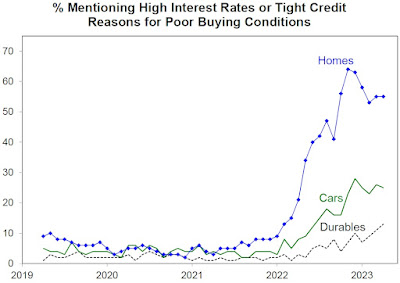Consumer Sentiment: FINAL Results for May 2025
Predicted: 53.0
- Actual: 52.2
- Change from Previous Month: FLAT (No Change)
- Change from 12 Months Previous: -24.46% (-16.9 points)
=========
- Final ICS Reading for April 2025: 52.2
- Final ICS Reading for May 2024: 69.1
=========
"...Consumer sentiment was unchanged from April, ending four consecutive months of plunging declines. Sentiment had ebbed at the preliminary reading for May but turned a corner in the latter half of the month following the temporary pause on some tariffs on China goods. Expected business conditions improved after mid-month, likely a consequence of the trade policy announcement. However, these positive changes were offset by declines in current personal finances stemming from stagnating incomes throughout May. Overall, consumers see the outlook for the economy as no worse than last month, but they remained quite worried about the future.
Year-ahead inflation expectations were little changed at 6.6%, inching up from 6.5% last month. This is the smallest increase since the election and marks the end of a four-month streak of extremely large jumps in short-run expectations. Notably, long-run inflation expectations fell back from 4.4% in April to 4.2% in May.
This is the first decline seen since December 2024 and ends an unprecedented four-month sequence of increases. Given that consumers generally expect tariffs to pass through to consumer prices, it is no surprise that trade policy has influenced consumers’ views of the economy. In contrast, despite the many headlines about the tax and spending bill that is moving through Congress, the bill does not appear to be salient to consumers at this time..."
Ending Four Straight Months of Steep Declines
MAY 2025 UPDATE
=========
The ICS is derived from the following five survey questions:
- "We are interested in how people are getting along financially these
days. Would you say that you (and your family living there) are
better off or worse off financially than you were a year ago?"
- "Now looking ahead, do you think that a year from now you (and your
family living there) will be better off financially, or worse off, or
just about the same as now?"
- "Now turning to business conditions in the country as a whole, do
you think that during the next twelve months we'll have good times financially, or bad times, or what?"
- "Looking ahead, which would you say is more likely: that in the
country as a whole we'll have continuous good times during the next five
years or so, or that we will have periods of widespread unemployment or depression, or what?"
- "About the big things people buy for their homes, such as furniture,
a refrigerator, stove, television, and things like that. Generally
speaking, do you think now is a good or bad time for people to buy major
household items?"
- Click here for more on how the ICS is calculated.
=========
The ICS uses a 1966 baseline, i.e. for 1966, the ICS = 100. So any number that is below the 1966 baseline of 100 means that the folks who were polled recently aren't as optimistic about the U.S. economy as those polled back in 1966.
The ICS is similar to the Consumer Confidence Index in that they both measure consumer attitudes and offer valuable insight into consumer spending.
=========
The "predicted" figure is what economists were expecting, while the "actual" is the true or real figure.
=========
=========
Labels: America, consumer, consumer_sentiment, consumers, FedPrimeRate, FedPrimeRate.com, soft_data, Spending, USA
|
--> www.FedPrimeRate.com Privacy Policy <--
CLICK HERE to JUMP to the TOP of THIS PAGE > SITEMAP < |












